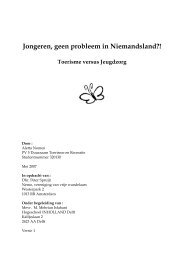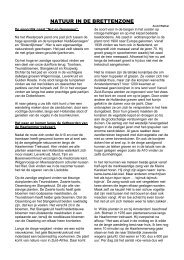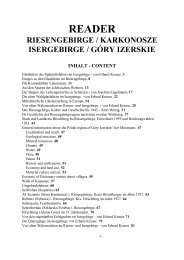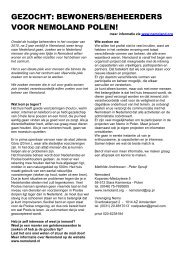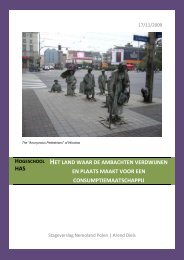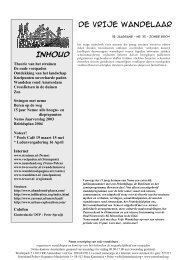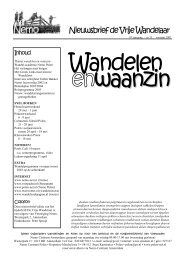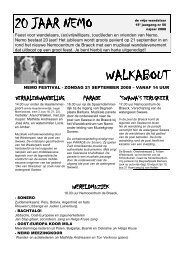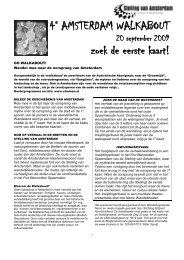Stara Kamienica - Nemo
Stara Kamienica - Nemo
Stara Kamienica - Nemo
Create successful ePaper yourself
Turn your PDF publications into a flip-book with our unique Google optimized e-Paper software.
production should be very robust and resistant to diseases. Drugs can only be applied for one<br />
or two times in the life of an animal.<br />
5.5 Living Conditions of animals<br />
Organic livestock producers are required to provide living conditions to accommodate the<br />
health and natural behaviour of the animals that they raise. All animals should have access to<br />
outdoor area and ruminants are also required to have access to pasture. Then, animals are<br />
required to have access to shade and shelter, as well as exercise areas, fresh air, and direct<br />
sunlight. The shelter must be designed to accommodate the natural maintenance, comfort<br />
behaviours, and opportunities to exercise. In general, animals are expected to have adequate<br />
space to be able to stand up, lie down, turn around, groom and engage in other behaviour that<br />
is natural. Shelters are required to maintain a temperature level, ventilation, and air circulation<br />
suitable to the species. Equipment and facilities must reduce the potential for livestock to be<br />
injured. These must be suitable to the species, its’ stage of production, the climate, and the<br />
environment. Animals must have clean, dry bedding, and if the bedding can be eaten, then it<br />
is required to be organically produced.<br />
Animals may be confined only on a temporary basis and then only for the following reasons:<br />
(1) Bad weather;<br />
(2) The animal's stage of production;<br />
(3) Conditions under which the health, safety, or well being of the animal could be<br />
jeopardized; or<br />
(4) Risk to soil or water quality.<br />
Manure Management<br />
Organic farms maintain stocking densities, rotate grazing lands, and manage manure to<br />
sustain the resource, nourish the animals, and maintain soil and water quality. Organic<br />
livestock operations should manage manure to prevent contamination of crops, soil, and water<br />
and optimize the recycling of nutrients from manure.<br />
Cleaning Compounds<br />
The materials used to disinfect livestock facilities must either be non-synthetic or appear on<br />
the National List and used consistently with any restrictions.<br />
The regulations for living conditions of animals in an ecological farming system are quite<br />
strict again. Taking all factors (feed, drugs and living conditions) into account, regional<br />
products that tend to ecological products will be easier to produce for farmers in the<br />
beginning. Later the farmers can try to apply for the ecological certificate.<br />
5.6 Training for farmers<br />
Recommendations about feed, drugs and living conditions of sheep in organic farming<br />
systems have been given. Not only from this businessplan farmers can get ideas about<br />
producing in an organic way, there are many places where farmers can get training on organic<br />
farming. This doesn’t mean they have to become full-time farmers, but training can give them<br />
more information on different aspects of animal health, restrictions of applying fertilizers and<br />
pesticides to the land and other organic information they’d like to learn.



